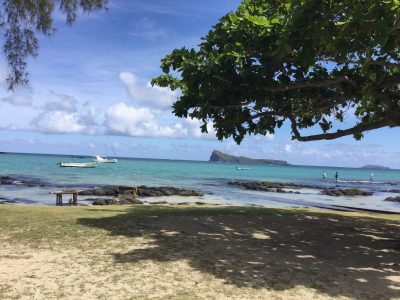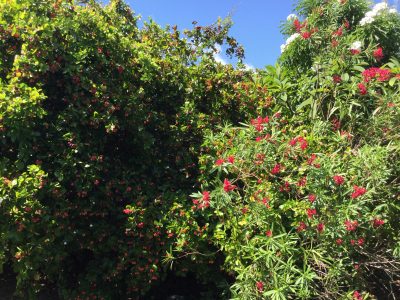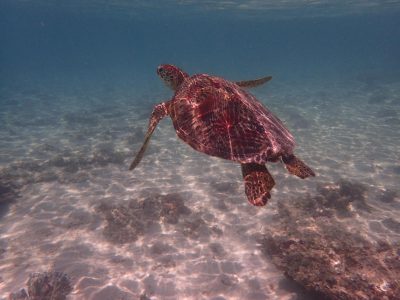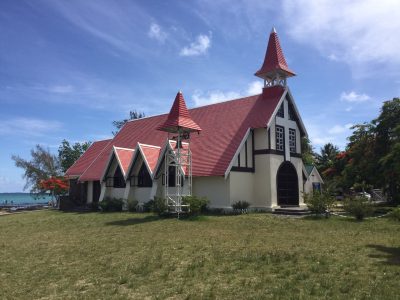Sometimes it takes time away to understand the implications of the lives we lead. When faced with the sheer bliss of another place, another reality, the impact of the West’s rampant consumerism on the environment and on our lives can be realised and reflected on, a different perspective seen.
This Christmas I was fortunate enough to leave behind the Western ways of celebrating Christmas and indeed existing in favour of an extraordinary and no doubt privileged universe where family has an enormous role to play – where the mirror was held up to us by looking in the faces of our children, aunts, great uncles, cousins and second cousins. All this happened to the backdrop of our precious ocean and the rhythm of the waves.
I have just returned from a visit to Mauritius – my husband’s family is from there and he is of the first generation to be born off the island. As such he still has extended family all along the northern coastline of that country. As you can imagine, if you go from winter in England to summer in the Indian Ocean, the way of life is strikingly different, in part because the heat means that life slows down. A different quality of life descends and a rare kind of rest reminds you of just how far away we are from that depth of stillness in our ordinary lives.
Our house was on the beach. The sound of the sea on the shore was a constant background to our days and nights. We led our lives outside or at least on the veranda, with fish to eat every day and curry cooked with the particular spices of the island. Someone was always frying onions, ginger and garlic somewhere – the lovely smell hung in the air.
While the sun set over the deep blue ocean, the sky and clouds anticipating the weather for the following day, we would prepare our own curries with tomatoes chopped for the essential chatini and a fervent discussion about which kind of chili chutney or mazavarou we were going to serve. We ate lentils slow cooked, “bred” – a generic term for greens and rice, achard (a vegetable pickle), yellow from mustard and turmeric. All the colours of the island on your plate at the end of a day when you had watched the sun rise with half an eye, aware that you could sleep on a little until it was time for some coffee and a plan for the first swim in the beautiful, clear waters.
The sea moved at the end of our garden, changing with the tides and the threat of a cyclone. Each day required a new navigation through patterns of seaweed, over golden sand to the turquoise of the water, neighbours who were cousins appeared all the time walking, swimming and inviting us to tea. Or we would walk along the beach to call in on family . The neighbour’s dog adopted us and followed us everywhere, much to the consternation of the great aunts we were visiting.
We arrived before Christmas and fled Brexit gloom, like a flock of migrating birds (those of you who are Gerald Durrell fans will notice the deliberate nod to his family leaving Bournemouth in the 1930s). We were escaping, not just from the cold, but the total takeover of the West by the cult of the individual, consumerism and a spendthrift and profligate model of Christmas. Ours has become a world where we are exhorted to spend to help shore up the fortunes of John Lewis and other benchmarks of financial stability. Columnists devote acres of screen and paper space to the analysis of dire high street sales relaying a perverted moral impetus on us all to buy things for the sake of the economy and the FTSE 100. Like a new form of priest in the pulpit or an Old Testament prophet, the columnist rails upon us 24 hours a day to shore up Western civilisation as we know it by continual spending and getting. This excessive reliance on an eternally growing economy is partly what is causing the ruin of our planet.
My family had travelled on ahead of me, to beat the prices, of course, of air flights – it is not lost on me that flying across the world is as sure a sign of a 21st century lifestyle as any. As my taxi took me through wet West London streets to Heathrow, the garish and feverish signs of invitations to excess were there in every shop and beside every bus stop. At the airport signs encouraged us to buy two bottles of gin not one, essential perfumes, cosmetics and more glamorous suitcases. It was hard not to feel jaded and overwhelmed by the assault on the senses and the bank balance.
Many, many hours later I was in Sir Seewoosagur Ramgoolam International Airport in Mauritius. There is no need here for much on the travails of the traveller when the plane is delayed by eight hours for incomprehensible reasons followed by the Captain announcing a further pause as the electronic maps have been mislaid. It is enough to simply arrive on the other side of the world, to be met by your family and taken to the sea, past stalls on the side of the road selling piles of lychees and mangoes and shops gloriously named Endjoy.
If Gerald Durrell’s family were leaving a rain sodden England benighted by 1930s economic misery, so I left a grey land for a vanilla coloured house with a garden gate leading to the sea. The veranda is surrounded by bougainvillea, palm trees, hibiscus and frangipani. Cardinals sing and the geckos which we love make creaking noises. Flocks of Serin du Cap rise and fall in groups like the birds from the Quangle Wangle’s Hat – theirs the Edward Lear’s Crumpetty Tree in real life.
Mauritius is very hot and a cyclone threatened. It turns out that it is not just the English who comment incessantly upon the weather. It transpired that there had not been a cyclone there for a while which was one reason the island was looking especially floral and lovely. As the wind rose, we went forth in a shopping frenzy as if preparing for No Deal Brexit and bought jerry cans of water, plenty of cereal and other random items considered essential for potentially being holed up for three days. The cyclone didn’t come but blew its way on another course. So then we had plenty of chat about how little breeze there was instead and everyone we met apologised for their moist faces.
Everyone there speaks English and French and a mixture of both – and they delight in their own island – you must go to the Île Plate they say – the water is deep blue there. But don’t go to Île aux Cerfs – the sand is terrible now. Our peregrinations, visits to cousins or great aunts (always with the dog of course) were defined by the urbane charm of Mauritians. They are well travelled and educated and have strong views on Brexit and Macron, who they regard with equal levels of disdain and bewilderment. They remark that it is not in the British psyche to don a yellow gilet – like our seasons, our national pragmatism is one of the things they profess to love about the English. They are saddened that the Europe they respect is descending into crude ugliness.
They also know that the desire to travel and broaden your mind is vital. Parents in Mauritius worry if their children are not ready to leave the island at least for a while – they know we all need a global perspective – even when living in paradise.
The strong presence of our beautiful earth made itself felt constantly in Mauritius. The sound of birdsong begins early there, presaged by the cockerel crowing at around 4.00 a.m. For all of us there is a growing awareness of the urgency of work needed to protect biodiversity in our world. Thus the visit we made to the Île aux Aigrettes where we saw pink pigeons and golden bats cemented the sense that we were on the trail of something profoundly life-giving. When Gerald Durrell wrote his book named after these birds and beasts, most were under threat and some he wrote about have not survived but many, happily, have. My family spent many, many hours swimming the reef just beyond the garden and on another trip to Île Plate they picked up the trail of a rare turtle and swam alongside it. Île aux Aigrettes is now a sanctuary and is a wonderful example of what can happen when enough people say we can change something. It is a very small island indeed – a very slow walk around it took an hour and half. But when you come from a culture soaked in cynicism and defeatism it is a tonic more wonderful than any cocktail to see what human belief in hope and beauty can achieve. We need to learn to live with our earth and truly to embrace what the Pope has called an ‘ecological conversion’.

Family remains incredibly important in Mauritius, as you will have gathered from the number of people we met who are styled “cousins” – removed or otherwise – and they were all delighted that we English had come to visit. And the Sunday after Christmas found us at the beautiful and iconic red roofed church at Cap Malheureux.
The priest (another cousin) gave a wonderful sermon on the Gospel which was the Finding in the Temple. How wise that story is. It is the story of Jesus travelling to Jerusalem with his family to visit the Temple. All goes well until a few days into the journey home, Mary notices that Jesus has not been seen for a while. So it is with large families. This is their great gift – especially to teens or children on the edge of one or other rite of passage. They can try out their different selves with different parts of their family. And how good for the teenage brain and emotional acceptance of self to see the different genetic heritage manifested in others – “how like George you are,” my youngest was told by a sister of my father-in-law who died a few years ago. While our eldest found an alter ego on the island – another second cousin exactly the same age with the same name. Their response to each other was a vision of the sleights of foot of gene pools. In this fascinating mix we watched our children as they revealed themselves working out who they think they are and who their relatives think they are.

And so in our Gospel, Jesus is not much missed for a while. Then panic ensues. Mary and Joseph make their way back through the caravan of people to no avail and retrace their steps to the temple. There they find Jesus teaching in what he is calling his Father’s house. Like many a child or young person, he doesn’t seem to grasp at all what has happened and why his parents might be in any way put out. Most of us don’t have to hear that kind of surprising truth, but we are asked as parents to find ourselves in our children in a way which is, if we allow it, unexpected and revealing. Another kind of truth is enabled when we look in our children’s eyes and we see ourselves – including the parts we didn’t know about.
Many years ago Gerard Hughes, the distinguished Jesuit priest, wrote a pivotal book called “God of Surprises” – this book argued for many things– a change of heart for us in the West in terms of how we related to global problems. His was the mantra of “If you’re not part of the solution you are part of the problem”. As a teenager I was profoundly inspired by the book – by his radical version of what it meant to be a Catholic Christian. We were being called to turn the world upside down and live differently so that others could simply live (to borrow a phrase).
The phrase, God of Surprises, appeared in the readings of the day at Mass on Monday 7th January. This is the Mass in which the Gospel speaks of a great light appearing in the darkness. Our God of Surprises is calling us to a change of heart, where we integrate a care for the earth with deep bonding with our families and children, with our work and, most importantly, with our rest. In these dark days of January we have begun the work, as a school, to remove single use plastic from our lives because we want our world to survive. We have begun our year moving away from a dreary trajectory where humans put themselves first, exploiting the world for their own purposes to a sun-filled universe of hope for the future, to what the Pope calls the inseparable bond between care for creation and inner peace.
The earth’s oceans have existed for nearly 4 billion years.
We have nearly destroyed them in just 70.
